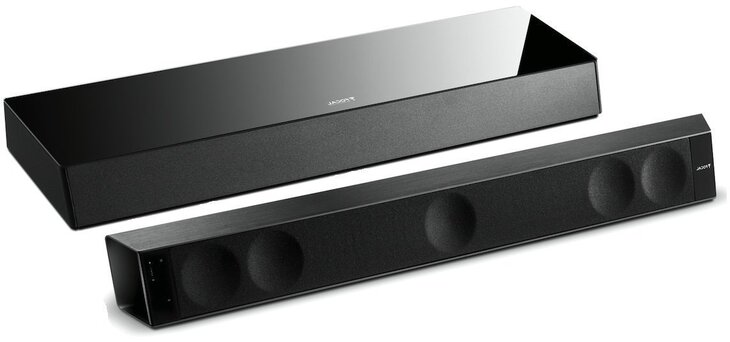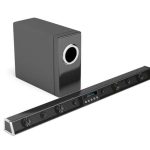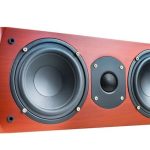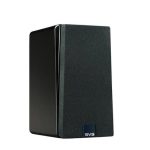As a serious audiophile, you’re always looking for novel ways of improving your home entertainment experience. The center channel speaker is one of the most important speakers to include in a home theater audio setup. It’s the speaker that outputs most of the dialogue. Thus, the kind of speaker you choose for the center speaker will determine the quality of dialogue you’ll get and your overall listening experience.
Essentially, you may be thinking about using a soundbar in place of a regular center channel speaker. However, can you get great sound output when using a soundbar as a center speaker? In this article, we’ll discuss whether you can use a soundbar as a center channel speaker in detail.
How does a soundbar work?
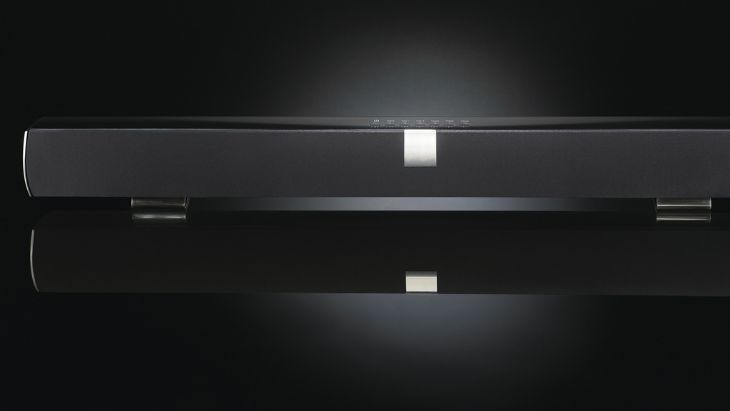
Soundbars are different from regular speakers. Although they look like regular speakers, they’re designed differently. In fact, both soundbars and center speakers are designed for placement in the middle front of a listening space. However, they’re designed to deliver different kinds of sound.
A center channel speaker is designed to project dialogue toward the front. On the other hand, a soundbar comprises several speakers that are tilted toward the sides to produce a surround sound effect. Thus, a center channel speaker will make you feel as if the sound is coming from the center whereas a soundbar is designed to make you feel as if the sound is coming from both the right and left channels despite being placed at the center.
Although a soundbar looks like a single speaker from the outside, it has several speakers built inside the speaker box. Each speaker plays a different role. The right and left speakers in a soundbar make use of the walls to bounce off the sound and create a home theater surround sound effect. Thus, it’s designed as a speaker that can offer the experience of an entire home theater system at a more affordable price and simpler installation.
Using a Soundbar as a Center Channel Speaker
Soundbars are designed as 2.0, 3.1, or 5.1 speaker systems. Technically, you can connect a soundbar as a center channel speaker. However, will it work as well as a regular center channel speaker? Let’s find out.
First, a soundbar has multiple channels. To use it as a center channel speaker, you need to hook it up to the center channel output on the receiver. Alternatively, you can use a splitter to plug the right and left inputs of the soundbar into the receiver. However, using a splitter would only work with a surround sound processor or an AV receiver. When you set it up this way, the speakers in the soundbar will output similar sound despite being angled as left and right surround sound speakers. However, their angled design will still make the sound bounce off the walls, thereby making the dialogue sound muddled.
Another way to connect a soundbar to use it as a center speaker would be to use a three-channel connection. This would be possible if the soundbar features a 3.0 or a 3.1 channel setup. In that case, you’ll connect the front, right, and center channels of the soundbar to the respective channels on the receiver. However, the effect of such a connection is that the right and left channel speakers will sound out of phase with other speakers in the home theater set up. Consequently, some spots will be heard as amplified while others will be heard as dead as a result of the speakers being out of phase.
Thus, regardless of how you hook up the soundbar as a center speaker, there will be inconsistencies in the sound output from the center channel. The reason behind this is that the sound waves coming from the soundbar interfere with those coming from other speakers in the setup. Thus, some sound waves will cancel each other while others will get amplified more than others.
You’ll also have issues with amplification when connecting a soundbar as a center speaker. Essentially, soundbars come with a built-in amplifier. Also, most AV receivers have a built-in amplifier that powers passive home theater speakers. Thus, when connecting a soundbar to an AV receiver, you’ll be feeding it with an already amplified signal. Consequently, there may be feedback problems that’ll result in poor sound quality due to double amplification. Also, you may damage the components making up the soundbar as you might be feeding it with more power than what its input can handle.
Is there a solution to the problems you’ll get when using a soundbar as a center speaker?
Although you may find it easy and affordable to use a soundbar in place of a center speaker, you won’t get the best sound quality. Thus, it’s something you shouldn’t consider. It’ll destroy the sound quality and in worst-case scenarios, you may end up with a damaged soundbar. You’ll be straining the center channel that’s meant for outputting dialogue. Overloading it will result in poor dialogue and destroy the surround sound effect that a soundbar outputs.
While a soundbar can improve the visual appeal of a home theatre setup, it’s not worth the sound output you’ll get when used as a center speaker. You can only do this if you’re not planning to use it at all, and that means you’ll be wasting your hard-earned money. In fact, a soundbar is designed for use with a TV as an affordable means of creating a surround sound effect without having to invest in an expensive home theater setup.
Final Thoughts
As you can see, it’s clear that you shouldn’t ever think about using a soundbar as a center channel speaker. There’re three clear reasons why such an idea isn’t advised. First, it’ll destroy the overall sound experience you’ll get in the audio setup, yet you want your audio setup to sound great. Second, you may destroy the soundbar due to feeding it with more power than its input can handle. Third, it’ll be easier and better to invest in a dedicated center channel speaker. A center channel speaker is specially designed for connecting to the center channel output and that’s why it’ll output better dialogue than a soundbar that’s designed for use a surround sound speaker system.
If you want to enjoy high-quality sound in your home theater audio setup, avoid shortcuts and use dedicated speakers for the job. Also, connect the speakers the right way. Overall, the best way forward is to invest in a complete surround sound system and an AV receiver. If you must use a soundbar, use it alone or alongside a subwoofer for a simpler and more affordable surround sound setup.
Michael Evanchuk is a San Francisco-based sound engineer with 20 years’ experience installing, troubleshooting, and repairing commercial, automotive, and household sound equipment. Evanchuk owns an auto stereo center, where he offers highly competitive car audio installation and repair services. He has written dozens of articles on different sound engineering topics, all of which have been published in leading journals, blogs, and websites.

